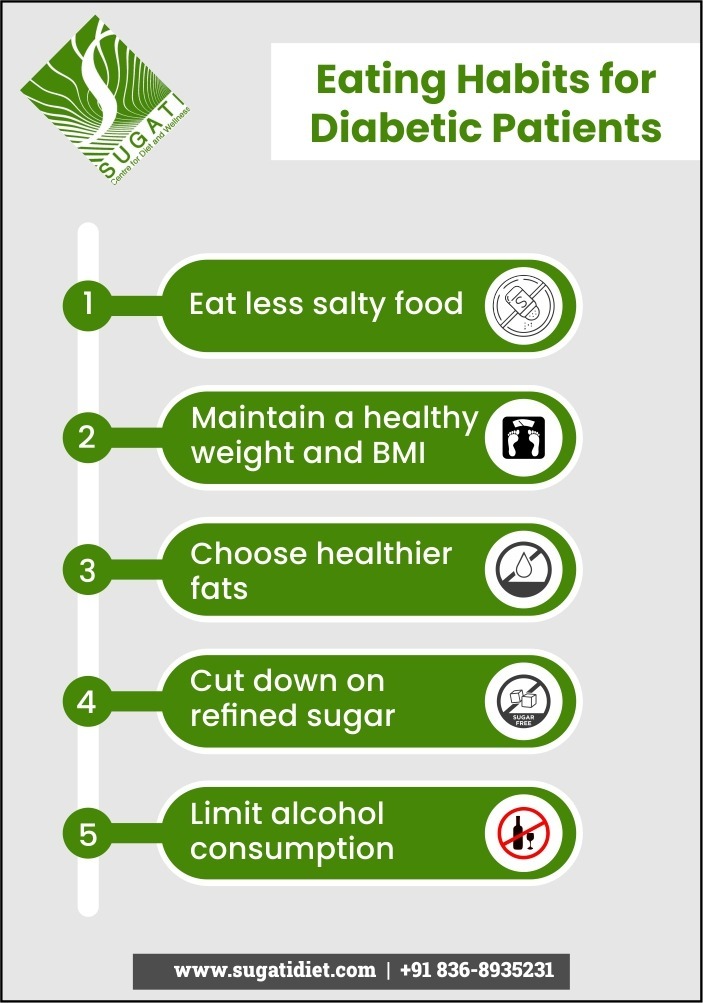
Do you know that diet plays a vital role in managing your blood sugar levels? Maintaining a balanced diet by including more of certain foods and limiting some foods helps keep control over your diabetes.
We will discuss mainly two major types of diabetes:
Type 1: Also called juvenile diabetes, is a condition in which the pancreas produces little or no insulin (hormone helping sugar to enter the cells to produce energy). It is mostly seen in children.
Type 2: This mainly occurs in adults and is a condition in which, apart from the pancreas producing less insulin, the cells do not respond well to insulin and take less sugar. This is usually found in adults.
Managing diabetes with a diet is simple- eating healthy food naturally rich in nutrients and low in fats and calories, in moderate amounts and at regular times. The key ingredients must be more greens, fruits, and whole grains.
We, through this article, aim to guide you over the best diet for people with diabetes with foods that you must include and those to avoid for both type1 and type 2 diabetes. With the help of your dietician, you can have a healthy diet plan to achieve fair control over your blood sugar levels.
Feel free to skip ahead if one topic catches your eye:
-
What is the best diet for diabetes patients- What to eat?
A diabetic diet plan will help manage your sugar levels, and weight and control risks like high blood pressure and high blood fats. There is no standard diet, but you and your nutritionist can create a plan that works for you in the long run.
Basically, for both type 1 and 2 diabetes, a healthy diet includes foods low in GI (Glycemic index), low carbohydrates and fats, moderate proteins, lots of vitamins and minerals, fruits, and food rich in fiber.
Type 1 diabetic diet:
It is important to keep consistency in your diet by not skipping meals and eating around the same time. Your diet will depend upon your body weight, insulin, and type of work and exercise.
Diet must include:
- Green leafy vegetables like spinach, kale, cabbage, lettuce
- Lentils and beans
- Whole grains like oats, brown rice, whole wheat
- Berries like blueberries, raspberries, strawberries, blackberries
- Nuts like walnuts, almonds, pistachios, etc.
- Citrus fruits like oranges, grapefruit, lemons
- Fatty fish like salmon and sardines
- Fat-free milk, yogurt, etc.
As type 1 diabetes mostly occurs in children, the diet has to include more proteins than the diet for type 2 diabetics, should not be very rigid, and must be child friendly.
The best diet for people with type 2 diabetes:
The main aim of managing type 2 diabetes is to reverse the insulin resistance of the cells and maintain healthy blood glucose levels. Weight management through diet and exercise plays an essential role. Diet must include:
- Fruits and vegetables
- Legumes like peas, beans, lentils
- Whole grains (minimally processed) brown rice, wheat, and oats.
- Moderate amounts of dates, avocados, nuts, seeds, soybeans, tofu, coconut, etc.
- Lesser amounts of animal proteins like organ meat, fatty fish with more omega -3 – fatty acids.
- Sweet potatoes in moderation (Helps to reduce the cells’ insulin resistance)
There are different healthy best diets for diabetic patients:
-
Low Carbohydrate diet:
It reduces carbohydrate content in your diet according to the body weight. This diet makes your body use fats instead of glucose for energy production (Ketosis)to improve sugar levels and maintain a moderate weight. Foods include:
o fatty fish,
o meat,
o vegetables and fruits
o nuts and seeds
o Olive oil
Recommended for both type 1 and type 2 diabetes.
- Paleolithic diet: This is based on a non-processed diet consumed during the ancestral age. This restricts a carbohydrate diet even more than a low-carb diet but is considered more filling. This insists on eating:
o Fruits
o Vegetables
o Nuts and seeds
o Omega -3- fatty acid-rich fish like salmon, mackerel, and tuna.
o Oils from nuts and fruits like olive oil and walnut oil.
It is recommended mainly for type 2 diabetes.
- Mediterranean diet: This focuses on people’s eating habits in Italy and Greece. It involves making small changes in your usual diet, which is easy to follow in the long run. It aims to reduce carbohydrates to some extent and focuses on whole grains and unprocessed food like:
o Plant-based foods like nuts and seeds
o Herbs, spices
o Fruits and vegetables
o Legumes and whole grains
o Fatty fish have more omega-3 –fatty acids, which help decrease triglycerides, reduce blood clotting, and lower the risk of heart failure.
o Olive oil is the main source of added fat in the Mediterranean diet.
It is a popular diet for type 1 diabetes and beneficial for type 2.
- Vegetarian/ vegan diet: This includes only plant-based foods and no meat, fish, eggs, or dairy. Including:
o Fruits and vegetables
o Beans and legumes like peas
o Whole grains
o Nuts and seeds
o Brown rice
o Whole wheat
o Millets like jowar, bajra, ragi, etc.
To avoid deficiencies, vegans must supplement their diet with vitamins, vitamin-fortified cereals, and fortified soy products.
It is a popular diet for type 2 diabetes but can be used for type 1, keeping a balance with insulin.

-
The best diet for diabetes- What not to Eat
Both types 1 and 2 must avoid high GI foods, trans saturated fats, too many animal proteins, and sugary foods.
Foods to be avoided for Type 1 diabetes:
- Sugary foods
- White bread
- white pasta
- Cookies, processed foods, chips, etc.
- Sodas (Both regular and diet)
- Anything written as hydrogenated on the label.
- High-fat animal products
- Fried food
Foods to be avoided for type 2 diabetes:
- Sugary foods and soda
- Fruits juices with sugar
- Food with high fructose corn syrup.
- Processed and red meats.
- Dried fruits
- White carbs
- Full-fat dairy products
- High-fat meat like beef, sausages, hot dogs
- Packed foods like chips, crackers, cookies, etc.
- Fried foods
FAQs
-
Why should my daily diet be consistent?
Consistency is vital to prevent your blood sugar from going too high or too low and helps you decide the dose of your medications more accurately.
-
Should I eliminate sugar in my diet completely?
Occasionally you can very well enjoy your favorite dessert. The important thing is moderation. You can cut on other carbohydrates when you eat sweets.
-
Can a person with diabetes have a high protein diet?
No, too many proteins, especially animal proteins, may cause insulin resistance. There should be a balanced diet including protein, carbohydrates, and fats, as recommended by the best dietician in Delhi for diabetes.
Takeaway
Visit Sugati, a center for diet and wellness, to get the highest quality of nutritional and wellness services. At Sugati, a holistic approach is practiced for complete preventive and lifestyle management to ensure you achieve the best health and fitness through customized, unique, simple, and sustainable solutions by the best dietician for diabetes in Delhi. The LEAN (lifestyle, exercise, attitude, and nutrition) is their principle to make you look and feel the best of yourself.
Recent Post
Crafted by Webcreatore Digital Solutions LLP.






